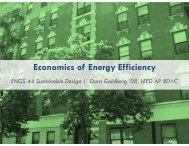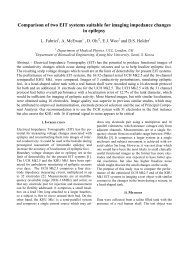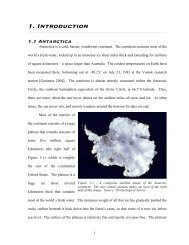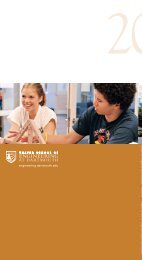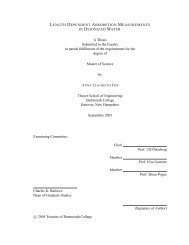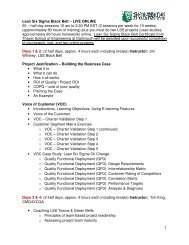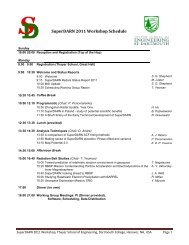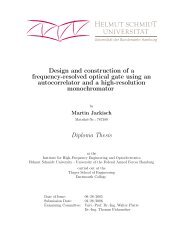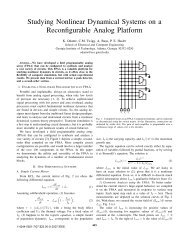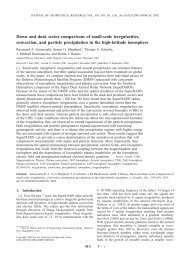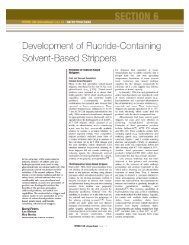Courses Programs - Thayer School of Engineering - Dartmouth ...
Courses Programs - Thayer School of Engineering - Dartmouth ...
Courses Programs - Thayer School of Engineering - Dartmouth ...
You also want an ePaper? Increase the reach of your titles
YUMPU automatically turns print PDFs into web optimized ePapers that Google loves.
undergraduate courses<br />
ENGS 15 Undergraduate Investigations in <strong>Engineering</strong><br />
Offered: all terms: arrange<br />
An original investigation in a phase <strong>of</strong> science or engineering under the supervision<br />
<strong>of</strong> a member <strong>of</strong> the staff. Students electing the course will be expected to have a proposal<br />
approved by the department chair and to meet weekly with the staff member<br />
supervising the investigation. The course is open to undergraduates who are not<br />
majoring in engineering. It may be elected only once, or taken as a one-third course<br />
credit for each <strong>of</strong> three consecutive terms. A report describing the details <strong>of</strong> the<br />
investigation must be filed with the department chair at the completion <strong>of</strong> the<br />
course.<br />
Prerequisite: Permission <strong>of</strong> the chair <strong>of</strong> <strong>Engineering</strong> Sciences Department; one-page proposal<br />
submission required and must be submitted for approval prior to the end <strong>of</strong> the term<br />
preceding the term in which the course will be taken.<br />
Dist: TAS<br />
ENGS 20 Introduction to Scientific Computing<br />
Offered: 10F, 11F: 10 11W: 10 11S, 12S: 11<br />
This course introduces concepts and techniques for creating computational solutions<br />
to problems in engineering and science. The essentials <strong>of</strong> computer programming are<br />
developed using the C and Matlab languages, with the goal <strong>of</strong> enabling the student<br />
to use the computer effectively in subsequent courses. Programming topics include<br />
problem decomposition, control structures, recursion, arrays and other data structures,<br />
file I/O, graphics, and code libraries. Applications will be drawn from numerical solution<br />
<strong>of</strong> ordinary differential equations, root finding, matrix operations, searching and<br />
sorting, simulation, and data analysis. Good programming style and computational<br />
efficiency are emphasized. Although no previous programming experience is<br />
assumed, a significant time commitment is required.<br />
Students planning to pursue the engineering sciences major are advised to take<br />
ENGS 20. Students considering the computer science major or majors modified with<br />
computer science should take COSC 5.<br />
Prerequisites: MATH 3 and prior or concurrent enrollment in MATH 8<br />
Instructors: Shepherd (fall and spring), Leblond (winter) Dist: TAS<br />
ENGS 21 Introduction to <strong>Engineering</strong><br />
Offered: 10F, 11F: 10 11W: 10A 11S, 12S: 10<br />
The student is introduced to engineering through participation, as a member <strong>of</strong> a<br />
team, in a complete design project. The synthesis <strong>of</strong> many fields involving the laws<br />
<strong>of</strong> nature, mathematics, economics, management, and communication is required<br />
in the project. <strong>Engineering</strong> principles <strong>of</strong> analysis, experimentation, and design are<br />
applied to a real problem, from initial concept to final recommendations. The project<br />
results are evaluated in terms <strong>of</strong> technical and economic feasibility and social significance.<br />
Lectures are directed toward the problem, with experiments designed by<br />
students as the need develops. Fall and spring, enrollment is limited to 64 students;<br />
summer, minimum <strong>of</strong> 20 students, maximum <strong>of</strong> 40 students.<br />
Prerequisite: MATH 3 or equivalent<br />
Instructors: Collier (fall), Lotko (spring), I. Baker (winter) Dist: TAS<br />
ENGS 22 Systems<br />
Offered: 11W, 12W: 9L, laboratory Tu, Th 11X, 12X: 10, laboratory<br />
The student is introduced to the techniques <strong>of</strong> modeling and analyzing lumped<br />
systems <strong>of</strong> a variety <strong>of</strong> types, including electrical, mechanical, reacting, fluid, and<br />
thermal systems. System input will be related to output through ordinary differential<br />
equations, which will be solved by analytical and numerical techniques. Systems<br />
concepts such as time constant, natural frequency, and damping factor are introduced.<br />
The course includes computer and laboratory exercises to enhance the students’<br />
understanding <strong>of</strong> the principles <strong>of</strong> lumped systems. Enrollment is limited to 60<br />
students.<br />
Prerequisites: MATH 13, PHYS 14, and ENGS 20<br />
Instructors: Lynd (winter), Trembly (summer) Dist: TLA<br />
69



